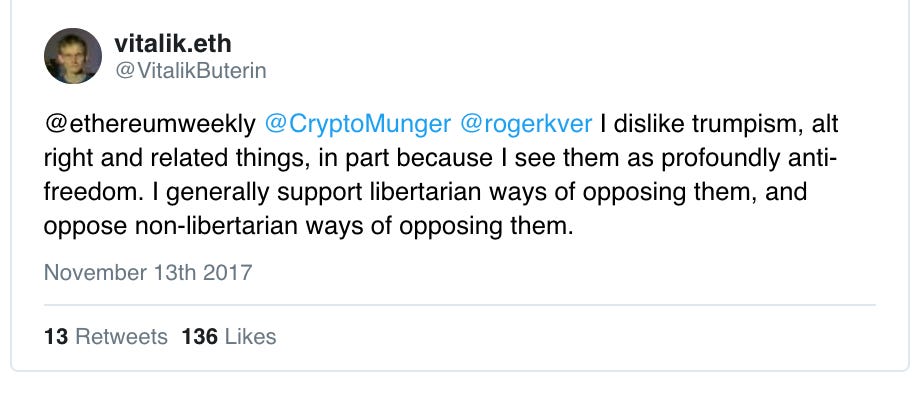I wanted to explore subjects that we weren’t able to write about in the first essay since it would have been too long. In this essay, I explore the link between colonialism and fascism, the origin of the shock doctrine that the crypto-evangelist wants to implement, and what are the links between all the actors who have an interest in an accelerationist society. From Italian futurists from the last century to more recent tech-bros.
I want also to thank Mathys Rennala, Steph TJ and Geraldine Juárez, for their guidance and patience during the writing of this text.
Protofascism
One of the main arguments developed in The Civic Foundations of Fascism in Europe by Dylan Riley is that fascism was the consequence of “rapid civil society development in a political context defined by three historically linked failures of hegemony1: first a failure of intraclass hegemony, then a failure of interclass hegemony, and finally a failure of counter-hegemony.”
Out of this power vacuum emerged a long process including going from a syndicalist marxist formation to a right-wing authoritarian u-turn. After the marxist theory was abandoned, the fascist party and Mussolini's intellectuals, including figures from the Italian operaismo and the poet D'Annunzio who had engineered ''The Italian Regency of Carnaro'', attained cultural hegemony.
As Dylan Riley put it ''the fascist movement did not propose a new political solution to Italy’s problems; instead, it identified politics as the problem. In this, the movement drew on a series of critiques of the liberal state going back to the Giolittian period2. These ideas formed an anti political ideology of civil society, or associationism, which was a central part of fascist doctrine both during the movement’s rise and during the regime itself.”
the way tech evangelist have pushed for D.A.O as a new form of governance, especially just after one of the biggest uprising against racialized police violence, sounds exactly like what Dylan Riley described above as identifying politic as the problem and the forming of anti-political ideology within society, this is basically the Californian Ideology 101.
At the intersection of techno solutionism and assetization,
lay something really uncomfortable, as Jonathan Beller put it in his article “Fascism on the Blockchain? The Work of Art in the Age of NFTs”:
“But the NFT explosion, which threatens to make all art the art of making money, shows the persistence of a financial imagination organized through racial capitalism: artworks become cultic derivatives of fascistic protocols. This fractalization of fascist aesthetics and practices becomes an active, if disavowed or even unconscious (because naturalized), force in platform design and utilization.”
Also as Fredric Jameson and Alica Kapal put it
protofascism "remains a reaction to and a defense against the continuing ideological threat and presence of a (defeated) Marxism, which thus occupies that taboo position around which the various fascist ideologies must organize themselves." If the Marxist, and later Bolshevik, threats function as catalyst, they must be accompanied by the weakening of other political forces: the elaboration of protofascism "as an ideology is, however, determined less by the practical dangers of Marxism or Communism than by the disintegration and functional discrediting — even after the failure of revolution on the Left — of the various hegemonic and legitimizing ideologies of the middle class state (liberalism, conservatism, Catholicism, social democracy, and so on). Or, as Kaplan puts it, both left and right must be weakened in order for fascism to be both left and right3.
We can also note that in October 1989, the Italian government allowed 170 Libyan citizens to visit the islands of Ustica, Ponza, Favignana on which Libyans had previously been confined after some pressure.
Futurism and Colonialism
Sergio Panunzio, one of the main theorist of facism, head of the Fascist Faculty of Political Sciences at Perugia University in 1928, predicted a “period of systematic reconstruction after a long revolutionary interlude a period that would be under the influence of Gentile’s “Actualist'' idealism, together with nationalism, socialism, and futurism4”
as James Gregor put it “Notable figures, like Filippo Tommaso Mari- netti, the founder of twentieth-century Futurism, together with many of his followers, directly or indirectly became involved with the new Fascist government.5”
As Robert Mallet put it in “Mussolini in Ethiopia, 1919–1935: The Origins of Fascist Italy’s African War”
“D’Annunzio and a band of Italian army deserters and mutineers punctuated by a smattering of anarchists, syndicalists, futurists and Nationalists converged upon the city of Fiume and ‘captured’ it for Italy. D’Annunzio and his ‘legionaries’ acted very much as the prototypes for the Fascist movement that was slowly taking shape in the turbulent Italy of 1919.”
So how did this ideology translate to colonialism and most importantly what was the inception of it?
Clearly the poet’s chauvinistic, warmongering rhetoric didn’t arise out of a vacuum. Italy was consolidated as a state less than 60 years earlier, with national sentiment growing in parallel with irredentism. Italian history scholars always state how Italy's colonial era was relatively late compared to their european counterparts. It seems that they overlook the fact that Italy wasn’t even a country when certain western powers were far ahead with their colonial crimes. Algeria was colonized by the French in 1830, while the Kingdom of Italy, the first version of a unified peninsula, was born in 1861.
Since its formation as a nation6, Italy had attacked Eritrea (1890), Ethiopia (1895-6) and established an ultimately genocidal invasion in Libya (1911-12) with the sending of libyan in concentration camps and deportation to Italy to crush any rebellion.
We can also note that in October 1989, the Italian government allowed 170 Libyan citizens to visit the islands of Ustica, Ponza, Favignana on which Libyans had previously been confined after some pressure.7
In the early years of Italy’s colonial era, expansionist governors in the colonies attempted to uphold the myth of their cultural superiority by eliminating schooling for Eritreans, for example, and discouraging unskilled Italians from emigrating [Palumbo]. Public speakers like D’Annunzio and the most prominent Futurist poet, Filippo Tommaso Marinetti, also fed into the colonizing outlook.
D’Annunzio’s written lines like “[Italy!] You smile upon the land that is your prey,” hint at how he glorified predatory violence. Historian Michael Ledeen notes that he “became an advocate of colonial adventures in Africa,” projecting a “paternalistic and dominating attitude” toward North African countries. Marinetti’s writings in this vein started with poems like La battaglia di Tripoli (The battle of Tripoli; 1912).
Marinetti was completing a novel, Mafarka the Futurist 8.
Mafarka, after conquering several kingdoms in northern Africa, renounces them to “become a builder of mechanical birds!” and so “give birth to my son without the help of the vulva!” Some have found its style strained and its symbolism heavy-handed; for others, its mixture of genres and camp exaggeration create a rich, polyphonic texture.
“Guido Corni, the former Governor of Italian Somaliland, contributed still further to the argument that Fascist Italy should in due course militarily conquer the Ethiopian Empire, before carving out a ‘true Southern Europe’ in the lands of the ‘Black Continent.’ Given that Italy was already the nation most heavily involved with Ethiopia it seemed logical that the Italians, the ‘masters of civilisation’, should increase their influence there significantly. Italy, Corni added in conclusion, ‘above all wishes to be and must also become a great African power''9
As Nicolas Perugini and Neve gordon recall, there were no paintings like the Picasso’s Guernica to recall the widespread destruction carried out by the airplanes in Ethiopia.10
recall, there were no paintings like the Picasso’s Guernica to recall the widespread destruction carried out by the airplanes in Ethiopia.
But instead it was Mussolini’s son Vittori, who was a Lieutenant in the Italian Royal Air Force, who gave an account to the extent of the horror of the incursions during the Ethiopian War of aggression(Second Italo-Ethiopian War) in his memoir “Flights Over the Amba Mountains”: “Combining a patriotic narrative with pictures immortalizing the ‘little black faces’ in their daily lives and aerial images of the destruction, Mussolini refers to his experience as the ‘beauty of war’, as the two historians put it “His enthusiasm echoed the ideas of Italy’s military experts and futurist thinkers – from Giulio Douhet to Tommaso Marinetti (1909, 1935) – who played a crucial role not only in theorizing military and political practices and processes but also in underscoring the aesthetics of aerial bombing. Since the aerial destruction of Libyan protestors in 1911, Italian thinkers claimed that airplanes comprised an extremely efficient tool for “pacifying” subjugated people in the “colonial peripheries” and were an essential part of human development (Hippler 2017: ix–xii, 25, 59, see also Lindqvist 2003).” 11
As explained in Discourse on Colonialism by Aime Cesaire, colonial violence modifies not only the colonized territory but the metropolis as well.
“all these lies that have been propagated, all these punitive expeditions that have been tolerated, all these prisoners who have been tied up and "interrogated, all these patriots who have been tortured, at the end of all the racial pride that has been encouraged, all the boastfulness that has been displayed, a poison has been instilled into the veins of Europe and, slowly but surely, the continent proceeds toward savagery.
And then one fine day the bourgeoisie is awakened by a terrific reverse shock: the gestapos are busy, the prisons fill up, the torturers around the racks invent, refine, discuss.”
Libertarian Ideology
libertarians behind the crypto ecosystem couldn't have found a better time to push for NFT in the arts, indeed they thrive in crisis.
“As media like XLR8R launch their NFT Marketplace for Electronic Music, we can already see the accelerationist model that one side of the “scene” is a part of.” 12
Again the sudden push for another techno-determinist solution in dance-music after uprisings all over the world it’s not a coincidence. This is clearly part of a reactionary agenda to silence any tentative of destituent power to reach another stage who will change the present.
To also add further context into the crypto-money frenzy I want to address a famous economist highly influential in the libertaian realm.
Milton Friedman, born July 31, 1912 and died on November 16, 2006 was an American economist. Founder of the “Chicago School” which was heavily influenced by the Austrian School Of Economics popularized by Fredrich Hayek.
As Naomi Klein put it regarding Milton Friedman, “Friedman believed that when the economy is highly distorted, the only way to reach that prelapsarian state was to deliberately inflict painful shocks: only ‘bitter medicine’ could clear those distortions and bad patterns out of the way. Cameron used electricity to inflict his shocks; Friedman's tool of choice was policy—the shock treatment approach he urged on bold politicians for countries in distress. Unlike Cameron, however, who was able to instantly apply his pet theories on his unwitting patients, Friedman would need two decades and several twists and turns of history before he too got the chance to put his dreams of radical erasure and creation into action in the real world.”13
The Infamous “Chicago boys” a group of Chilean economists, who were educated at the Department of Economics of the University of Chicago under Milton Friedman, implemented the shock doctrine all over South America, forcing libertarian14 policy under military dictatorships who would help North-American’s interest and the wealthy elite over the one of the population.
Hayek said about Pinochet’s era Chile "From the little I have seen, I think it is no exaggeration to talk of a Chilean miracle.” to address his economics. The enthusiasm of this theoretician of the Austrian economics school of thought can be explained, by the fact that he was able to witness the implementation of a series of economic reform who were almost following eye to eye the orthodoxy of laissez-faire libertarian economic policies, this could only happen under a military dictatorship as even Reagan america & Thatcher Britain could go this far in their own Friedman’s influenced economic reform, as they were “embarrassed” by the obstacle of parliamentary politics.
The list of reform almost read like a libertarian manifesto, I chose to put some excerpts below.
“The government welcomed foreign investment and eliminated protectionist trade barriers, forcing Chilean businesses to compete with imports”
“they made the central bank independent, cut tariffs, privatized the state-controlled pension system, state industries, and banks, and reduced taxes15”
the left, was able to vote to rewrite the constitution who was inherited from the military dictatorship only last week the 16/05/2021, the new constitution will be voted next year via a referendum.
Decentralized
Startup City movement frame their ideology as radical decentralization.
decentralizing governance they can create”new societies”16
Governance becomes a service that is provided by a corporation and not a collective construction created by citizens, as described in William Gibson’s dystopian novel Neuromancer. Citizens become consumers of that service and ''vote'' with their feet by leaving for a suitable dystopia.
It wasn't lost on me that ZEDE (Zone for Employment and Economic Development), charter cities in Honduras, were implemented after Honduras experienced a coup in 2009 followed by a transition which led conservatives to take power congress and the executive power. Which then voted for special legislation for the ZEDE17 in 2011.
Interesting to highlight also that Milton Friedman grandson Patri Friedman, son of anarcho-capitalist theorist and member of The Libertarian Party David Friedman, is behind, the Seasteading project which is trying to build sovereign ocean colonies . Definitely Trying to finish where grandpa left out.

We can also see a similar development in the U.S with Carson city (Nevada) working on legislation to establish similar areas in Nevada would allow technology companies to effectively form separate local governments. called ''Innovation Zones in Nevada''
This share similitudes with one aspect of the crypto ecosystem favourite concept, D.A.O. A decentralized autonomous organization (DAO), an organization represented by rules encoded as a computer program that is transparent, controlled by the organization members and not influenced by a central government.
DAO's financial transaction record and program rules are maintained on a blockchain.Sold to us mere mortals as the peak of democracy when in application members of the DAO with the biggest number of tokens are the one who have the biggest power in terms of decision. So basically regular dad politics implemented in computer programs.
On a article called On-Chain Vote Buying and the Rise of Dark DAOs published in 2018 researcher Philip Daian, Tyler Kell, Ian Miers, and Ari Juels, already warned about the following : “The blockchain space today, with predictable results, continues its tradition of ignoring decades of study and instead opts to implement the most naive possible form of voting: directly counting coin-weighted votes in a plutocratic fashion, stored in plain text on-chain. Unfortunately, it is not clear that better than such a plutocracy is achievable on-chain. We show that the permissionless model is fundamentally hostile to voting.”
You have to be really naive to think there is a use case for progressive politics in this field, when every single part of it is gate kept by money.18
I went on to read Colony, a technical white paper. I don’t know if there is something more on the money than a bunch of white tech bros calling their “Ethereum-based protocol for creating and operating Internet Organizations” a colony.
You can read in their White Paper the following19 ;
“Colony’s long-term vision is of trustless organizations; organizations in which members can safely collaborate and manage shared resources, ithout needing to know or trust each other. Early Colonies may find that a larger emphasis on human moderators to be useful, while more mature colonies may find reasons to devolve increasingly more decision-making to extensions implementing trustless functionality. We will refer to colonies which make substantial use of these extensions as trustless colonies.”
NFT In Music
if you been in the ''left-field music industry'' for long enough you might have the chance of witnessing a dozens of different grifts, the ''scene'' is now almost totally indistinguishable, with the startup realm, where young entrepreneur are in a race to make the biggest financial exit, except that in the ''scene'' there is no backing of Venture Capital,at least not yet, except for ventures like Boiler Room I guess. Which makes the whole ordeal embarrassing to witness20
To quote DFB,Jr ''NFTs are like Beanie Babies or Pokemon cards, which have swept up another generation of white and white adjacent financially motivated grifters to stir up hysteria around yet another new financial venture.Meanwhile, in the real world at the time of this writing, 500,000 people in the US have died of coronavirus, approximately 10 million workers are unemployed, while 7 million people in Texas lack heat, food, and water during preventable blackouts caused by a winter weather climate disaster striking a vulnerable decentralised power grid that has spurred opportunistic energy companies to spike the billing for electrical and propane power into the $1,000s.''21
He also note the following that I think it's relevant with what i'm trying to develop in this essay ;
''Jesse Walden, a founder/investor in the venture capitalist firm Variant, spoke as a guest on Mat Dryhurst and Holly Herndon’s Interdepence podcast, which stages »conversations with figures shaping 21st century culture.« Despite the jovial conversation with the musicians-turned-podcasters, Walden’s thought process and technical approach to culture as a project, rather than as a communal expression, offers a perfect example of what could be likened to a modern day oil salesman, speaking in abstractions, buffering meaning into place as the structural momentum of their scam and entrapment scheme solidifies behind the scenes(..)Walden listed his decade of experience working with platforms such as Red Bull Music Academy, Boiler Room, and Spotify, after managing artists such as Solange and Dev Hynes (Blood Orange) through multiple artist promotion startup ventures – which he describes as »projects« that mysteriously end and cyclically transmute into »new projects.«''
It is also worth noting that it is quiet embarrassing and revealing that Mat Dryhurst and Holly Herndon’s 'Interdependence'' podcast introduces its almost-always-white guests as '' figures shaping 21st century culture”, leaving no doubt on who they believe is leading the scene forward.
From AI to NFTs, Mat Dryhurst has successfully managed over the past decade to position himself as an expert on new technologies and their integration in dance music communities. Pushing for a certain form of technodeterminism reminiscent of the CCRU and schools of thought which are very adjacent to Nick Land’s early work, Dryhurst tend to abstract interpersonal dynamics from their historical and sociological context in order to offer new technologies and new technologies alone as a way forward of the multiple crises rocking the music industry. In this context, there is very little room in his analysis for a critical view on the heavily patriachal, white supremacist and neoliberal basis of the (dance) music industry.
A perfect example of this is his very complacent interview with Richie Hawtin hosted by Berlin's startup co-working space 'Factory Berlin'' for Sónar+D. Alongside his wife Holly Herndon, Dryhurst patiently listen to Hawtin explaining “what went wrong” with the whitewashing of techno. The scene is striking by its lack of self-awareness. Here you have three white people unable to grasp with the simple fact that there is no whitewashing of techno without whitewashers. It’s easy to understand why Richie Hawtin would rather avoid going into that territory, considering his decisive role in popularising dance music on the old continent, through a very white-on-white feedback loop between North America and Europe which severed the ties established between the African diaspora across the Atlantic Ocean. And again, the solution offered is a technological one. And this is where Dryhurst’s technodeterminism comes in. Indeed, the path forward for dance music communities isn’t through accountability, conflict resolution, rehabilitation of dance music’s true history, and togetherness (in other words, putting the BLACK back in techno). Instead, the solution offered is a purely technocratic one: in a cryptographic system which isn’t based on trust or shared values, the blockchain ecosystem allegedly guarantee safe and trustless interactions between different agents, which NFTs are a use case.

Ben Davis from Artnet, went into the rabbit hole by looking at 5,000 Images in Beeple’s $69 Million Magnum Opus. this is the most heinous and atrocious collection I was ever able to peep. Only Marinetti when he makes the case for “give birth to my son without the help of the vulva!” can tackle this level of misogyny and racism in his novel Mafarka the Futurist
So far it adds up that the two of the most racist institutions, the art world and tech combine their force to increase the wealth of someone who produces art anchored in racism and misogyny.
In Beeple art there are recurrent images of erected penis. Benjamin Noys in his Book “Malign Velocities explain it this way “the usual armoured trope of erecting the hard, phallic and mechanized male body over and against the feminized: soft, liquid, and organic.” Bridging the (ableist, misogynist) anti-humanist and technological obsessions from the Futurist manifesto, Noys continues ;
“The phallic ship thrusting from the hillside seems to embody exactly the masculine and protofascist mastery over nature by technology and acceleration. D’Annunzio wrote that the prow of a warship was ‘a monstrous phallic elongation’.[1] It embodies what Paul Virilio, writing of the Italian Futurist F.T. Marinetti, called the ‘inhuman type’: ‘an animal body that disappears in the superpower of a metallic body able to annihilate time and space through its dynamic performances.’[2] D’Annunzio’s personal motto ‘per non dormire’ (‘In order not to sleep’) captures perfectly, in advance, this vectoring of human will into a mechanized acceleration that displaces any organic need. It might also stand as the motto for contemporary capitalism, which, as Jonathan Crary has noted, declares war on sleep as one of the few residual and non-productive human activities.[3]”
As it’s described in the previous piece the crypto ecosystem is a tapestry of crypto-colonizers with backing from notorious figures from the neo-reactionaries movement22
“What’s wrong with cashing in and elevating artists and collectors far above the hordes? A programmable economic medium has, in principle at least, the capacity to democratize finance and indeed to create economic democracy to an extent never before seen. The NFT in and of itself, the ERC 721 or 1135, is not by definition a fascist form.
It is possible, for example, to imagine powerful uses for tokens that serve as unique identifiers for agreements between parties that can in turn be used to collateralize transactions. I offer you X, you offer me Y and based on that agreement we not only build something new but have the means to finance it and share stake with others in our network. Multiply by a billion.
But the sudden perfect fit of the NFT with the cult of genius, and the cult of personality, great artist, celebrity, super athlete and billionaire does not bode well for the democratic and post-capitalist promise of blockchain as the infrastructure of a sustainable world. Playing into habitual aesthetic ideals, this fit with a reactionary tradition threatens to obscure what is really radical about shared stake in aesthetic performance and value creation. Some will shrug, dismiss the “dreamers” and say so what, I don’t care if there’s blood in my code so long as I’m getting paid. That, of course, is the world we know. There’s blood in the banks, in the money and in the code.”
Also NFTs are mostly linked to the Ethereum blockchain, who was co-founded by Vitalik Butterin someone who says that the platform where the Capitol hill coup was partially orchestrated have the right to exist and explained back in 2017 that he “dislike trumpism, alt right and related things, in part because I see them as profoundly anti-freedom. I generally support libertarian ways of opposing them, and oppose non-libertarian ways of opposing them.”23I’ve been watching HBO’s Q: Into The Storm recently and they have 8 chan former founder Fredrick Brennan, on record saying that his old platform should not continue, after several white supremacist posted their “manifesto’’ in there, while the image board members cheer them up, among other things. Crypto Libertarian type, don’t even have the self awareness in them to see how discussion boards used by white supremacist to organize attack,radicalize themselves and so on , can have a nefarious global impact and talk about supporting libertarian ways of opposing them, and oppose non-libertarian ways of opposing them. All this attached to an Americanized version of free speech.


and talk about” supporting libertarian ways of opposing them "and oppose non-libertarian ways of opposing them. All this attach to an Americanized version of free speech.25
This is what you support unprovoked (among other things), by going behind the technology and I didn’t even talk about his link with Putin for which he created a governmental Russian Ethereum fork.26


As “autonomous” thinker, Antonio Negri suggests the metropolis rather than the individual workplace is the new focus of political activity and accordingly calls for new forms of ‘militant metropolitan inquiry'.
Maybe that is the reason, startup city aficionados and crypto-bro want to defect building their own metropolis, via D.A.O network or economic special economic zone 2.0 ? Is that a coincidence that both Nick Land and Steve Bannon lived in Shanghai ?
People are organizing to fight techno-solutionist narratives and you can notice how this struggle is located within Metropolis. 27
We can once again find inspiration in the Operaist tradition and particularly in what is called Post-digital 28studies,to find resources to fight neo-reactionaries from the digital realm. I want to be clear on that point.
It doesn’t matter if you identify as a fascist,conversator, classic liberal ,progressive, leftist or whatever political label if you are involved in the crypto realm and more particularly in NFTs you are participating in a struggle, on the wrong side of history.
Not only enabling modern day colonization but in a more abstract way, enabling the assetization of music and the further fetishization of the monetary value of art, which become the only interesting part, and this why minted NFTs artwork look all the same, because content doesn’t matter ? Also what is interesting is that they mostly share a fascist aesthetic, barely hidden, so it’s really a win/win situation here, right ? the other thing who can seem pretty abstract but when we look into it for 5 min. Is the financialization of every single aspect of society.
The responsibility of tech workers in racist and neo-colonial politics is getting more and more light and some of those white collar worker are pushing back against it, but let’s not kid ourselves here, best case scenario you are creating derivative software to help brands better understand their customers on a burning planet29 worst case scenario you indirectly enabling genocide. Refusing tech as it is presented now, by it’s marriage with capitalism. Should be the new aim of our generation. Big tech was already struggling hiring people when they basically killed the hobbyist/Hacker scene in order to maximize profit with aggressive politics aiming to protect “Intellectual Property“.
Hence the push for dev boot camps combined with V.C who will fund almost any tech company under the sun, with a preference for white founders of course (as you always give preferential treatment to people who looks like you right ?).
Countries30 have been looking into regulating crypto some go as further than simply banning it.
As HelenHester put it Xenofeminism
Technological change is a ‘process subject to struggles for control by different groups’, the outcomes of which are profoundly shaped by ‘the distribution of power and resources within society’.
As such, any emancipatory technofeminism must take the form of a concerted political intervention, sensitive to the fused character of the structures of oppression that make up our material world
since the outcomes are profoundly shaped by the distribution of power and resources within society, you have to be really naive to think that predominantly white men, who flirt with fascism when they don’t just claim it, will let marginalized identity have a say in how they conduct things, we saw in my precedent article The Italian Regency of Carnaro : accelerationist origins of fascism, how Brock Pierce and Alt-right Political strategist Steve Banon, where linked and how he claim The Dark Enlightenment as a source of inspiration. They have money, political influence so to put it bluntly : “power “ and in the case of Brock Pierce are literally able to fulfill their crypto-colonizer project in Puerto-Rico.
So if one wants to challenge them it will be through a unified political struggle and fight against their attempts to influence the cultural sector in their search for hegemony.
let’s just put an end to this shit show and as Geraldine Juárez put it, build the Ghostchain who would be : “decapitalis[e] these chains and make it socially and politically expensive to keep adding blocks in them, until blockchain infrastructures eventually turn into abandoned ghostchains.
No assets. No blocks. No chains. Disconnect the crypto-farms.”
Originally published via Jean-Hugues Kabuiku Substack.
Following the piece The Italian Regency of Carnaro : accelerationist origins of fascism co-wrote by Steph TJ.
Wiki : In Marxist philosophy, cultural hegemony is the domination of a culturally diverse society by the ruling class which manipulates the culture of that society—the beliefs and explanations, perceptions, values, and mores—so that the imposed, ruling-class worldview becomes the accepted cultural norm;[1]][2] the universally valid dominant ideology, which justifies the social, political, and economic status quo as natural and inevitable, perpetual and beneficial for every social class, rather than as artificial social constructs that benefit only the ruling class.[3] This Marxist analysis of how the ruling capitalist class (the bourgeoisie) establishes and maintains its control was originally developed by the Italian philosopher and politician Antonio Gramsci (1891–1937).2
Wiki : the period between the start of the 20th century and the start of World War I, when he was Prime Minister and Minister of the Interior from 1901 to 1914 with only brief interruptions, is often referred to as the "Giolittian Era".[3][4]
A centrist liberal,[3] with strong ethical concerns,[5] Giolitti's periods in office were notable for the passage of a wide range of progressive social reforms which improved the living standards of ordinary Italians, together with the enactment of several policies of government intervention.[4][6]3
Barbara Spackman - Fascist Virilities_ Rhetoric, Ideology, and Social Fantasy in Italy4
Panunzio, Introduzione all societa` delle nazioni, p. 19.5
Mussolini's Intellectuals Fascist Social and Political Thought6
The first kingdom of Italy was a French client state - after Napoleon’s defeat in 1815, Italy was divided into seven main states. Since most of these territories were controlled by Austria (in the north) and Spanish Bourbons (in the south), unification came about in part through diplomacy and in part through conquest or civil war. The regents in Piedmont allied with France to gain military and financial aid against Austria, in exchange for the territories of Nice and Savoy. Essentially, with French aid, the northwestern autonomous region of Piedmont gradually expanded its regime to the rest of the peninsula. Unification with the South took the form of an occupation by the Piedmontese more than any bottom-up movement.7
The Origins of the Libyan Nation Colonial Legacy, Exile and the Emergence of a New Nation-State by Anna Baldinetti8
Filippo Tommaso MARINETTI. Mafarka le futuriste. Sansot & Cie, Paris 19099
Mussolini in Ethiopia, 1919–1935: The Origins of Fascist Italy’s African War- Robert Mallett10
Perugini, Nicola, and Neve Gordon. “Between Sovereignty and Race: The Bombardment of Hospitals in The Italo-Ethiopian War and the Colonial Imprint of International Law.” State Crime Journal, vol. 8, no. 1, 201911
Futurism An Anthology (Henry McBride Series in Modernism) by Lawrence Rainey, Ms. Christine Poggi, Laura Wittman12
https://jeanhugueskabuiku.substack.com/p/the-italian-regency-of-carnaro-accelerationist13
The Shock Doctrine: The Rise of Disaster Capitalism – Naomi Klein14
Neo-liberalism doesn’t describe a mode of production under capitalism and is not a helpful term, I recommend the excellent thread of @Vicky_ACAB on this. I describe what Milton Friedman student implemented as libertarianism, as it is what the libertarian school of thought advocate for a state until they meet the ultimate goal which is getting rid of the state to bring us to techno-feudalism. “Pinochet's stated aim was to"make Chile, not a nation of proletarians, but a nation of entrepreneurs" this can’t be more transparent and it’s a rhetoric that we find back in the west. Why does the left want to use this term which doesn’t mean anything “neoliberalism” to describe for example the Chilean experience when you had Milton Friedman identifying as a small l “libertarian” ? Who are even the “neoliberal” thinkers?
As Walter Block Put it “. The name “Milton Friedman” has been connected over the years with a whole host of free enterprise initiatives,4 and this is certainly a large part of libertarianism.5 For example, he opposes rent control (Friedman and Stigler, 1981), minimum wages (Friedman, 1962, 1980, 1983; Brozen and Friedman, 1966), socialized medicine (Friedman, 2001), tariffs (Friedman, 1962, 1975, 1977, 1997),6 and wants to reduce the size of government (Friedman, 1987).” references : http://www.walterblock.com/publications/is-milton-friedman-a-libertarian-2/15
https://en.wikipedia.org/wiki/Miracle_of_Chile16
https://en.wikipedia.org/wiki/Zone_for_Employment_and_Economic_Development_(Honduras)18
for example it can cost $2000 to get your icon on a wallet app from a github push request
https://github.com/trustwallet/assets/pull/735819
https://colony.io/whitepaper.pdf20
https://www.cbinsights.com/company/boiler-room-funding21
https://www.ctm-festival.de/magazine/social-music22
https://jhkabuiku.medium.com/the-italian-regency-of-carnaro-accelerationist-origins-of-fascism-8042f30f325a23vitalik.eth @VitalikButerin@ethereumweekly @CryptoMunger @rogerkver I dislike trumpism, alt right and related things, in part because I see them as profoundly anti-freedom. I generally support libertarian ways of opposing them, and oppose non-libertarian ways of opposing them.November 13th 201713 Retweets136 Likes24
https://edition.cnn.com/2019/08/04/business/el-paso-shooting-8chan-biz/index.html25
The right to spread hate speech without facing any consequences while doxxing and harassing minorities26
https://futurism.com/ethereums-founder-struck-a-deal-with-a-russian-bank-to-create-ethereum-russia27
Negri, A. (2018). From the factory to the metropolis.28
“The idea of the postdigital does not imply that the time has arrived when we have moved beyond the digital, but rather that we turn our attention to the concept of the digital and the ways in which it is incorporated into systems, subjectivities, practice, and language.” Postdigital Possibilities: Operaismo, Co-research, and Educational Inquiry
Patrick Carmichael29
Wendy Liu -“Abolish Silicon Valley: How to Liberate Technology from Capitalism”30
After Chinese efforts to ban crypto Thailand SEC just announced they banning crypto meme https://www.coindesk.com/no-doge-allowed-thai-sec-bans-meme-fan-and-exchange-tokens-as-well-as-nfts
